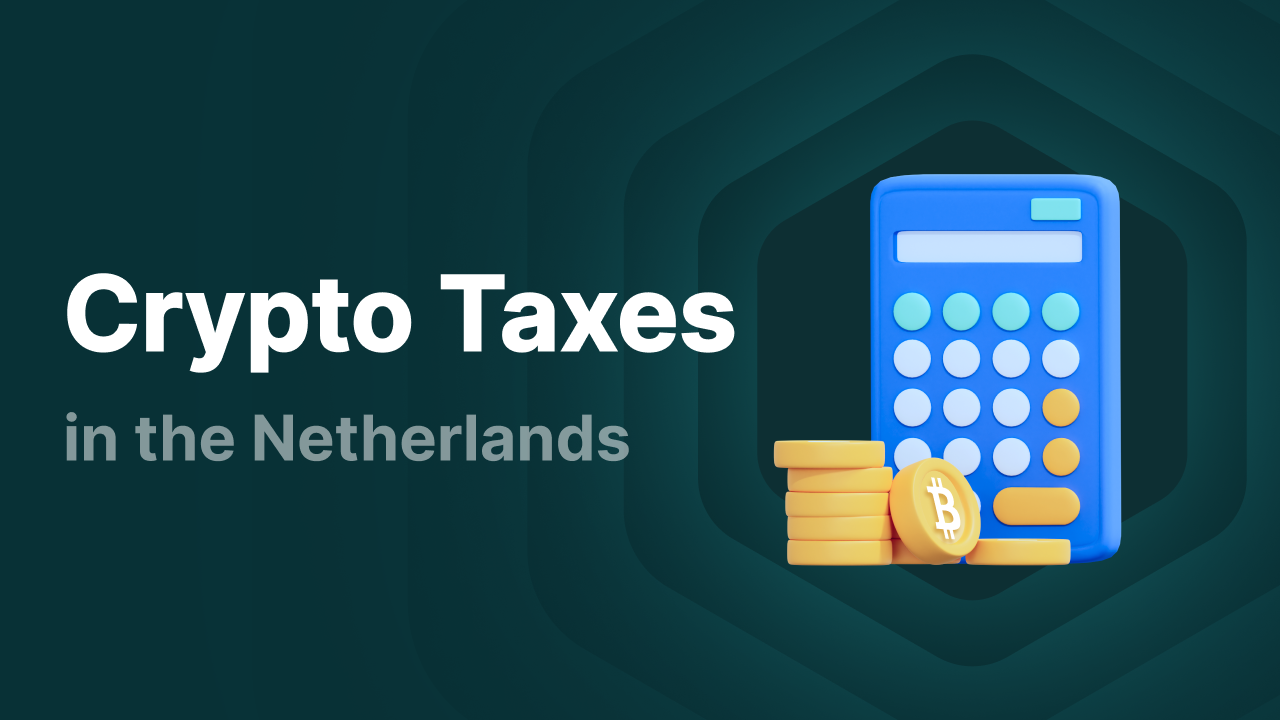Crypto Taxes in the Netherlands: The Comprehensive 2024 Guide

Crypto and taxes...that can be quite the confusing topic. So, we set out to create a guide to help you crack the crypto tax mystery. Please be advised that this guide does not serve as tax advice. For tax advice, please consult the Tax and Customs Administration (Belastingdienst) and/or an official tax advisor.
As of the 1st of March 2025, you can file your tax return for 2024 with the Belastingdienst.
In short, yes, your crypto holdings are taxable in the Netherlands. But if you’re looking for a bit more guidance, no worries, our Dutch Crypto Tax guide has got you covered.
In the Netherlands, crypto is considered an asset for tax purposes. Rather than a Capital Gains Tax, taxation is based on the assumed returns from your total asset value in the previous financial year, with a 36% tax on this notional gain. In some cases, Income Tax may also apply.
The method for calculating assumed returns changed in 2023, so it’s important to stay informed and check the latest guidelines to understand how this may affect you.
Is Crypto Taxable in the Netherlands?
Yes, it is. The Dutch Tax and Customs Administration, known as the Belastingdienst, considers cryptocurrency a taxable asset.
Can the Belastingdienst Track Crypto?
Yes, Dutch tax authorities have ways to track crypto transactions. Crypto platforms may be required to share customer information with the Belastingdienst if requested. This applies to both large and small exchanges, so it’s always good practice to be transparent about your holdings.
Later this year, the new EU data-sharing directive (DAC8) is expected to take effect, providing tax authorities with more insight into crypto holdings—similar to how they monitor bank accounts and pensions. To stay on the safe side, Dutch financial experts recommend accurately reporting your crypto assets.
How is Crypto Taxed in the Netherlands in 2024?
In the Netherlands, cryptocurrency is treated as an asset under the wealth tax system, rather than being taxed through capital gains. This means that the tax you pay is based on the assumed return of your total assets, rather than on the actual profit you make from buying or selling crypto. Here’s a clearer look at how the system works in 2024.
Crypto is included under Box 3 of the Dutch tax system, which covers savings and investments. The tax is calculated based on the deemed yield, or a fictitious return, of your assets. This is determined by the value of your holdings on January 1 of the tax year. For 2024, the tax rate on this assumed return is 36%.
The deemed yield varies depending on the type of asset. For example, the yield on bank balances and savings is 1.44%, while for investments (including crypto), it is 6.04%.
There is also a tax-free allowance that applies to your total assets. If you’re an individual, the allowance is €57,000, and for couples, it is €114,000. This means that only the value of your assets above this threshold is subject to tax. If your total assets are below the allowance, you won’t be taxed on them.
When it comes to reporting your crypto holdings, they should be included in Box 3 of your tax return, based on their value on January 1. If you trade crypto professionally or earn it as income, you will need to report it under Box 1, where it is taxed as regular income.
It’s important to understand that there is no capital gains tax on crypto in the Netherlands. The tax is applied to the presumed increase in value of your assets, whether you sell or hold your crypto. Essentially, the tax is based on the increase in value of your assets, not on any actual gains you realize.
For 2024, the method for calculating the deemed return has changed. The calculation is now based on the actual distribution of your assets, rather than using an arbitrary allocation. This makes the process more closely aligned with the actual value of your holdings.
Since the Dutch tax authorities can track crypto holdings, it’s important to report your assets accurately. Keeping your information up to date will help you avoid any penalties. If you’re uncertain about how this applies to your specific situation, it’s always worth checking the latest guidelines or speaking with a tax professional for clarity.
Do You Pay Tax When Buying or Selling Crypto?
Simply purchasing crypto isn’t taxable. However, you’re taxed on the total value of your holdings at the start of the year (January 1st). This means selling crypto doesn’t trigger a tax directly, but it can affect the value of your overall assets for the next tax cycle.
Tax on Gifting or Inheriting Crypto
Crypto gifts are tax-free up to €3,244, or €6,604 if from a parent. Donations to registered charities (ANBI) are tax-deductible, provided they don’t exceed 10% of your annual taxable income.
Reporting Lost or Stolen Crypto
If you’ve lost or had crypto stolen, you can deduct it from your tax return—assuming you can prove you once owned it.
When Is Crypto Tax Due in the Netherlands?
Tax season kicks off on March 1st in the Netherlands, and the deadline for filing is May 1st.
Your Finst Annual Overview
Trying to figure out what the value of your crypto holdings on your Finst account was on the 1st of January 2024? We’ve got you covered with our ‘Annual Overview’ feature. Your annual overview is expected to be available in February each year and you will be contacted via email once this is available to you.
To find your annual overview, simply follow these steps:
- Log into your Finst account.
- Tap on the ‘Menu’ icon.
- Scroll down and tap on ‘Annual overview’.
- The value of your Finst crypto holdings on 01/01/2024 is the € amount displayed in the 01/01/2024 row.
Please keep in mind that this only takes into account the crypto you hold with Finst.
Disclaimer: This article is not tax advice and should not be interpreted as such. You are responsible for informing yourself about how to correctly report your crypto holdings to the tax authorities.
